We’ve all heard Bhutan is beautiful, but is the cost of a trip to Bhutan worth $250 per day? After three weeks in Bhutan, here are my honest thoughts on whether or not the Bhutan trip cost is worth it.
$200 to $250 per day, per person. At least. That’s how much a trip to Bhutan costs. So is tourism in Bhutan worth the money?
Compared to budget-friendly neighbors such as India and Nepal, Bhutan’s trip cost is steep. Yet there’s no denying Bhutan’s tourism allure, and I know many of you are beyond intrigued. Ever since I entered the country, I’ve been fielding the same question over and over:
“Is a trip to Bhutan worth the $250 tourism fee per day?”
After more than three weeks of travel in Bhutan—and obsessively assessing whether or not the Bhutan tourism fee is fair—I have my final answer to the question whether Bhutan is worth the cost of $250 a day:
If you can afford it, absolutely.
Index: What you need to know about the cost of travel to Bhutan
- How much does a Bhutan trip cost?
- Why is Bhutan’s tourism fee important?
- Why I think Bhutan is worth the trip cost
- To travel to Bhutan or not to travel to Bhutan?
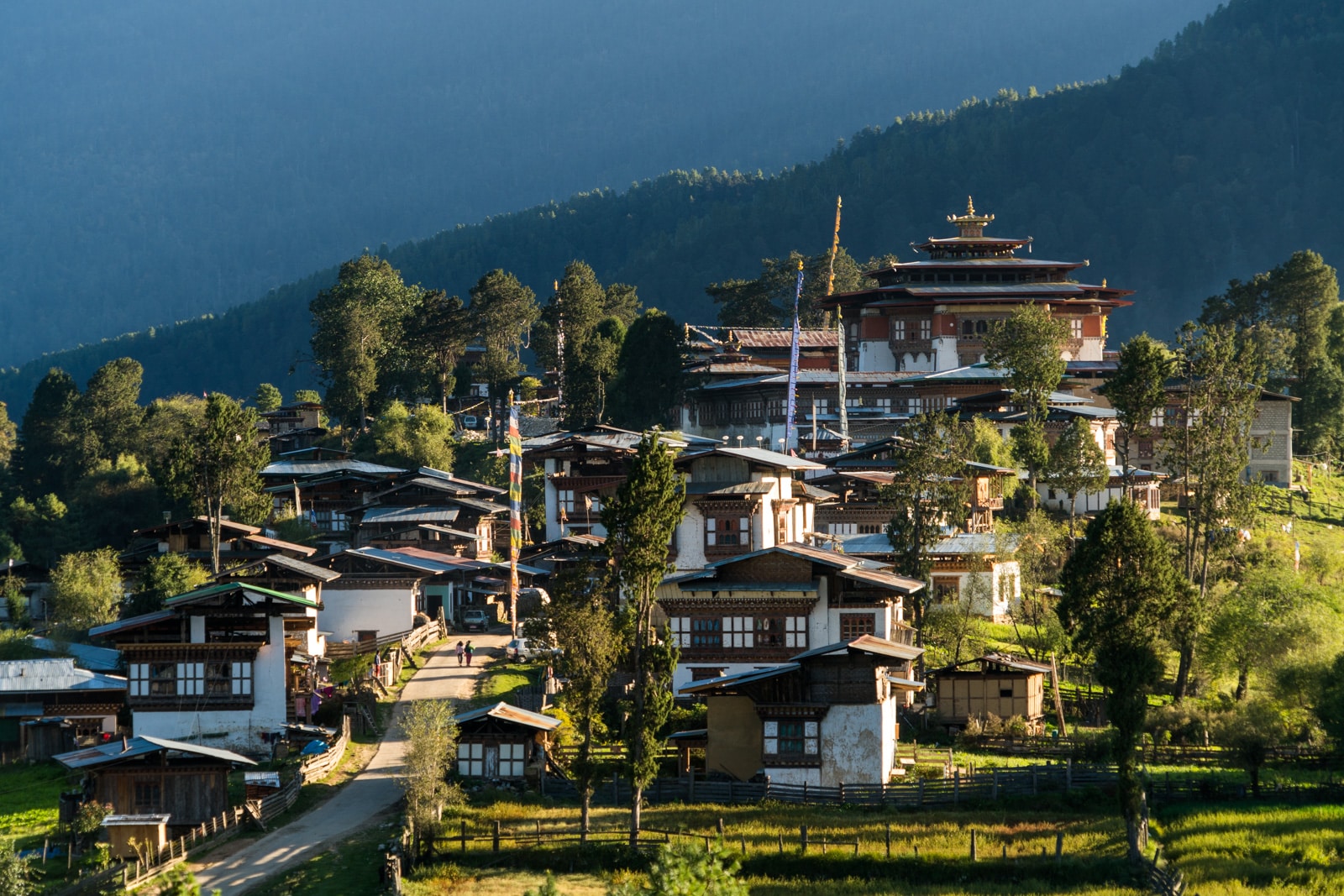
Monastery atop a hill overlooking Phobjikha Valley, surrounded by small but pretty Gangtey village.
How much does a Bhutan trip cost?
I’ll elaborate on why Bhutan is worth it in a hot second, but first, let’s clear up some misconceptions about the cost of travel to Bhutan:
How much does it cost to travel to Bhutan?
Basically, the cost of a trip to Bhutan doesn’t have to exceed the minimum daily fee.
The minimum daily fee for most foreigners is:
- $250 per person per day from March – May, and September – November (high season)
- $200 per person per day from December – February, and June – August (low season)
Many people are confused because they think Bhutan’s daily tourist fee is a cost on top of other travel costs, but the opposite is true: it’s basically an all-inclusive trip cost!
However, it’s possible you’ll need to pay more depending on how you will be traveling:
- Solo travelers: An extra $40 per day to the standard cost of traveling in Bhutan.
- Two person private tour: An extra $30 per day, per person.
- Luxury travelers and high-altitude trekkers: Those looking for more luxurious accommodations in 5-star hotels and resorts should expect to pay several hundred dollars more per day. The same goes for those interested in trekking with high-quality gear and camping equipment.
There are some discounts available, primarily for students and children ages 5 – 12. See the Tourism Council’s website for more details.
Bhutan trip cost for Indians, Bangladeshis, and Maldivians (regional travelers)
Indians, Bangladeshis, and Maldivians used to be exempt from the daily fee requirements, due to reciprocity demands between governments.
However, starting July 2020, they will have to pay 1,200 Rs per day (roughly $16) to visit Bhutan. As of 2021, Indian, Bangladeshi, and Maldivian tourists are also now required to be part of an organized tour when traveling to Bhutan. The main difference is that they do not have to pay the same minimum daily rate as tourists from other countries.
The reason for this price increase is that in recent years, regional tourism to Bhutan exploded—more than 60% of tourists to Bhutan were Indian in 2018—threatening Bhutan’s system of low traffic, high value tourism. There were also many concerns about the environmental impact of regional tourists as pollution increased at tourist sites and the number of vehicles on the road skyrocketed. These new regulations are an attempt to manage the new flows of tourists while preserving Bhutan’s original tourism strategy.
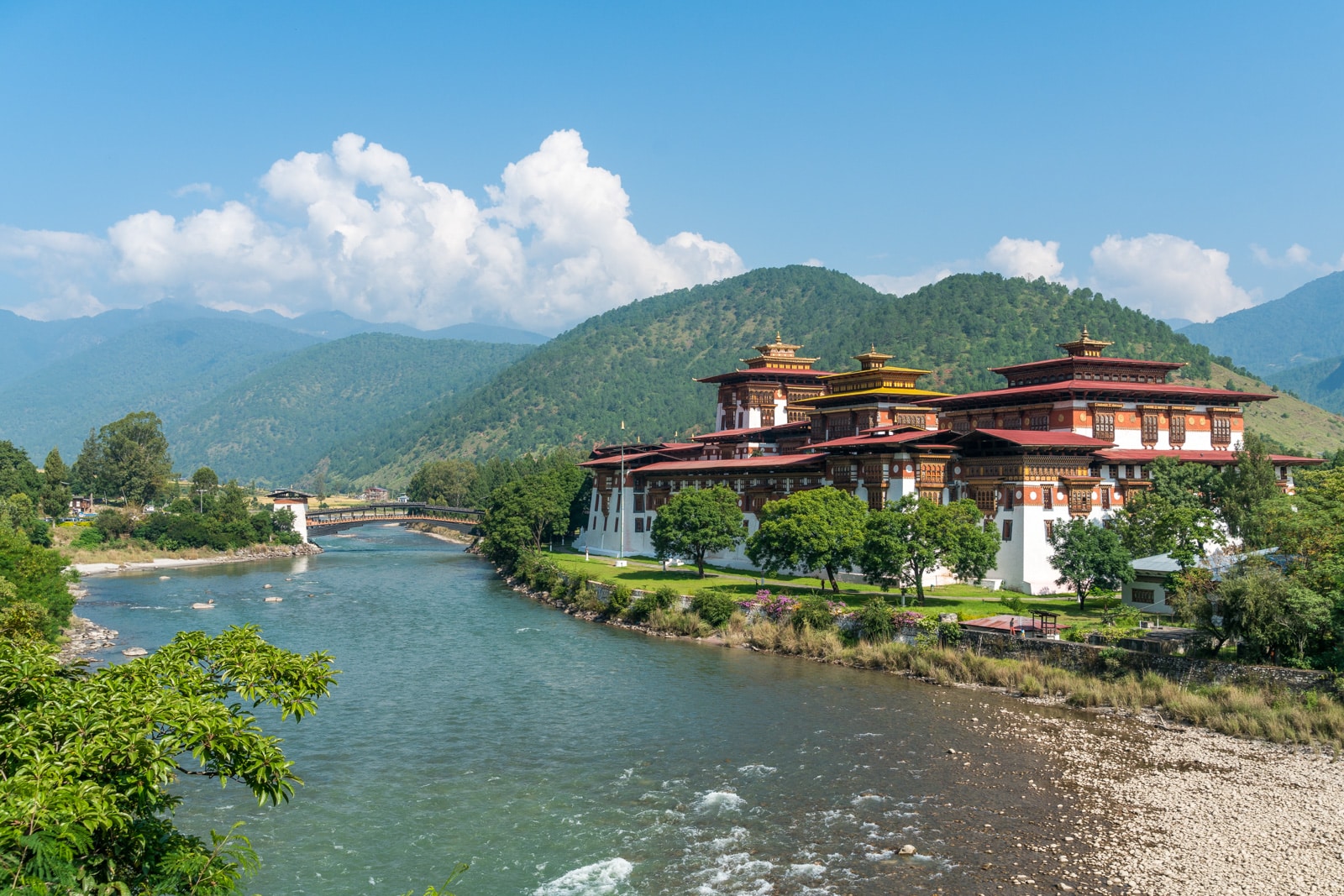
Punakha dzong, the largest fortress in the country
What’s included in the Bhutan tourism fee?
Many people assume Bhutan’s tourist fee is something paid on top of other expenses in the country. Not so!
The daily fee for Bhutan should include:
- Visa to Bhutan
- Licensed Bhutanese guide from an official Bhutanese tour operator. My guide was incredibly chill, helpful, and a great companion throughout my 3+ weeks in Bhutan.
- Driver and transportation. Usually, this means a comfortable and new 4×4, or a medium-sized tour bus. Internal flights are not covered.
- Accommodation. Hotels are all at least 3-stars, clean, and often spacious with impeccable service. Homestays and camping can also be requested.
- Entrance fees to tourist sights
- Food and drinks. Hotel restaurants are the norm, but if your tour group is small, ask to eat at local restaurants. Your guide should grant your wishes without any extra cost, but you’ll have to pay for any alcohol. (Protip: Bhutanese wine not recommended.)
- Trekking gear. If you’re going on a trek, that is.
- All taxes within the country
Basically, the Bhutan tourist fee covers all of your necessary expenses within Bhutan. The only common costs not covered by this fee are:
- Flight to/from Bhutan
- Souvenirs
- Alcohol
- Tips for guides and drivers (expected at around 10% of the tour cost)
Once you’ve paid your tour company, you could theoretically waltz into Bhutan without cash, no problem… though your guide will deserve a tip by the end of your trip!
For more information about what is officially included in the minimum daily cost of travel to Bhutan, see the description on the official Bhutan Tourism website.
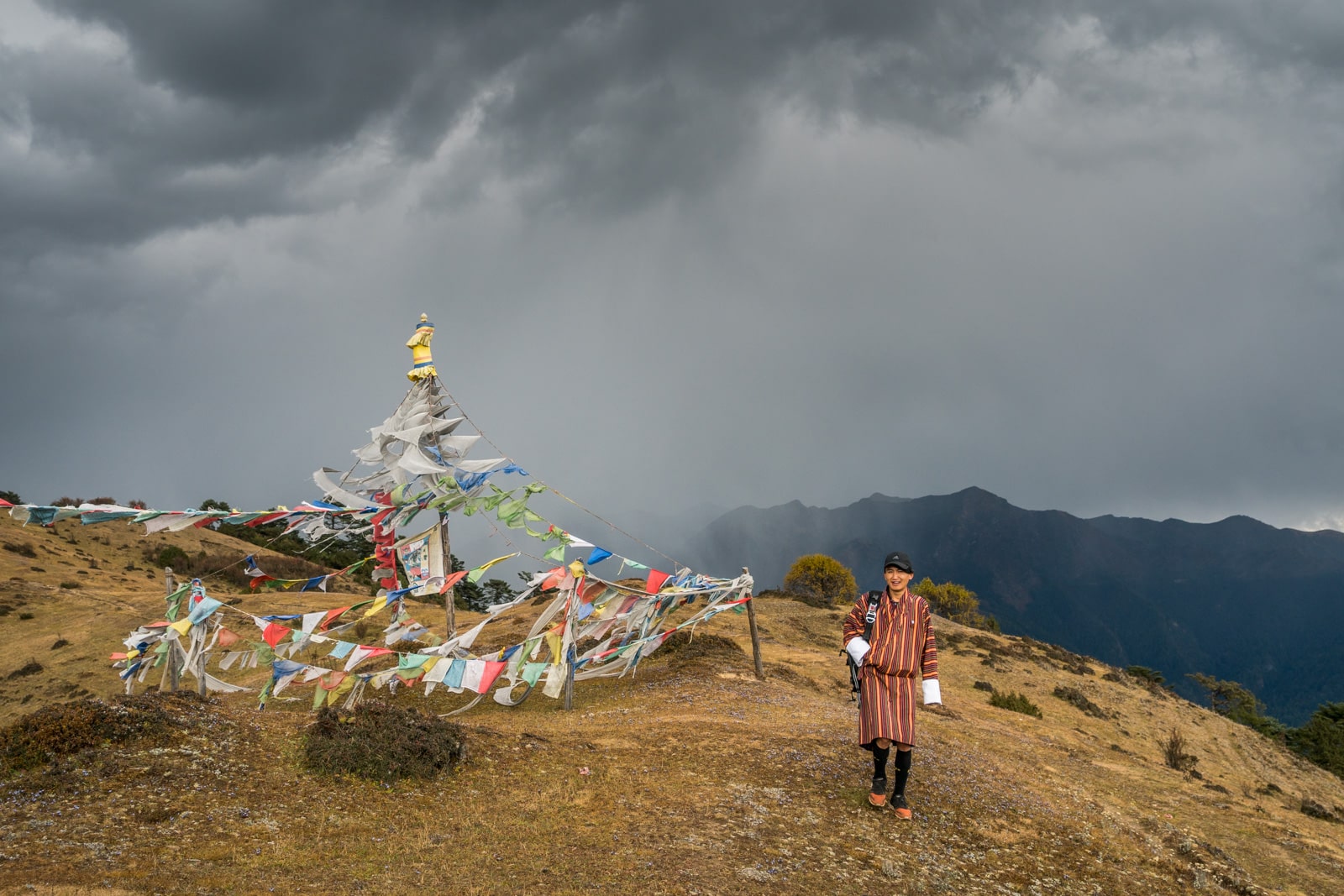
My guide and friend, Karma, who most definitely deserved all the tips by the end of my 3+ week adventure
Where does revenue from the Bhutan tourist fee go?
Ah, the important question!
Obviously, a slice of the pie goes to the tour agency, guides, drivers, hotels, etc. What’s more interesting is the $65 per day going to the government’s “sustainable development fee”.
Fancy name aside, this means around 30% of your money goes to Bhutan’s government. Though no government is totally transparent in its spending anywhere in the world, Bhutan’s government is legitimately committed to offering its citizens free health care, education, infrastructure, and more.
Even to the average tourist, the results of this money are visible. I had extended English conversations with 12-year-olds, there’s a slick new highway being built across the country, and I was told stories of Bhutanese people being sent abroad for medical treatment… free of cost!
Beyond my own personal experience, actual data illustrates a similar picture: despite the fact that many people in Bhutan live in extremely remote regions and depend on agriculture for income, 99% of citizens have access to clean water, 99% of houses have electricity, primary school enrollment is at almost 99% (and 95% of students make it to the last grade of school)… and I haven’t even mentioned Bhutan’s continued commitment to being the only carbon neutral country in the world and maintaining at least 60% tree coverage of the country at all times.
Skeptical? Still curious? It’s a bit dense, but this 2018 UN sustainable development report (PDF) has all the stats about Bhutan’s successes and shortcomings.
But why is Bhutan’s tourist fee that important?
Some of you have griped to me that it’s not a tourist’s responsibility to play charity, but consider Bhutan’s situation:
Bhutan is a land-locked country of only 700,000 people, with limited options for export or industry due to its remote, mountainous terrain. Much of the country’s population is poor, and 8% live below the international poverty line. The government is grappling to maintain Bhutan’s well-preserved culture in the face of rapid development and modernization.
Tourism is one of the very few major industries in Bhutan, but unbridled tourism in Bhutan can quickly consume the country and its culture… especially when the country is home to less than one million people.
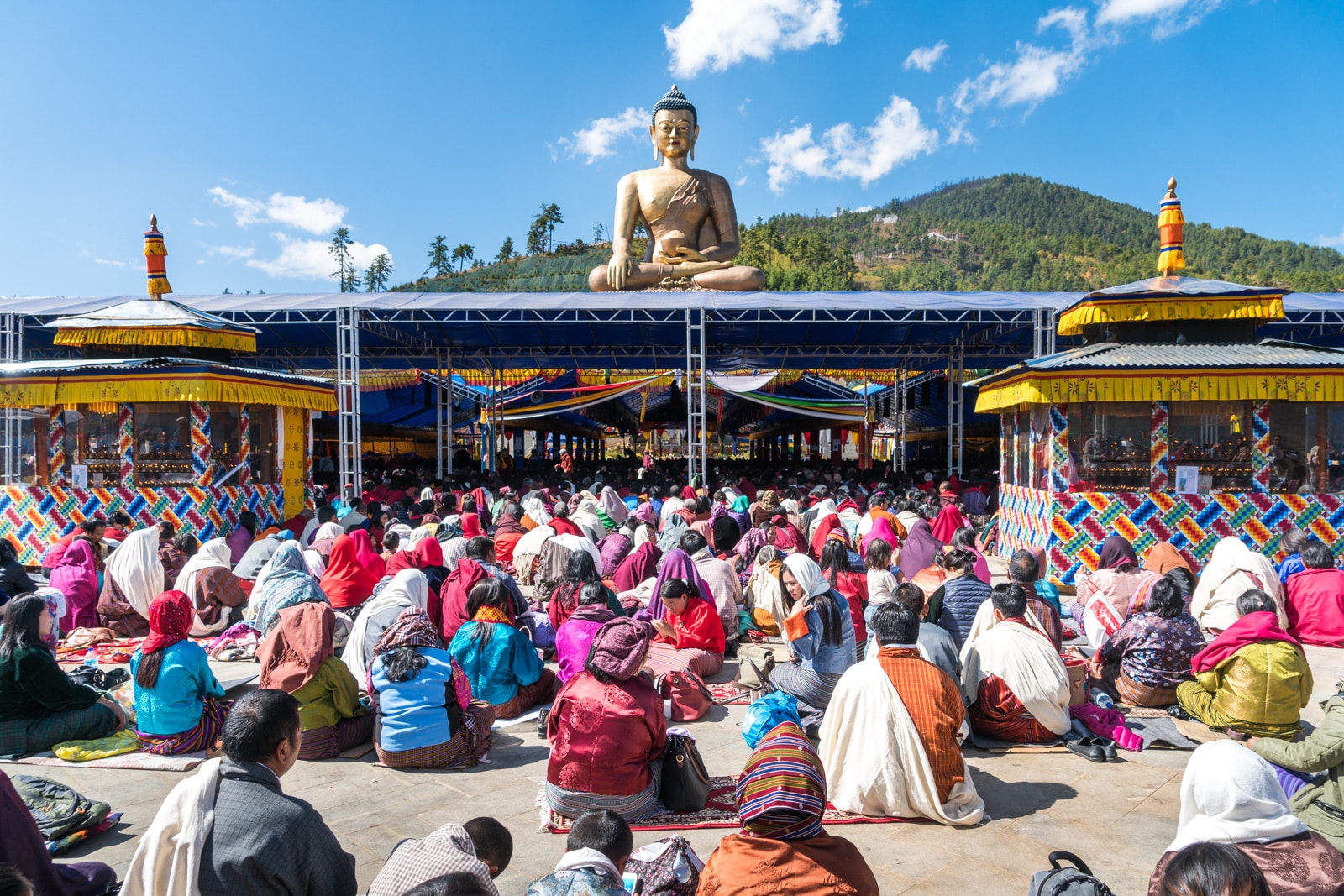
Thousands of people coming to listen to the teachings of a renowned monk at Buddha Point in Thimphu
Bhutan doesn’t want to become the next Venice sinking under the weight of millions of holiday goers, nor attract the hordes of culturally insensitive backpackers who flood Southeast Asia, Nepal, and India. The country wouldn’t be the same if drunk backpackers in elephant pants staggered by locals in traditional gho and kira. And that’s coming from someone who wobbled ‘round Asia in said pants years ago. Yes, I admit it.
Bhutan makes great efforts to adhere to sustainable tourism standards, and we should laud their efforts in this age of destructive mass tourism. Though their system isn’t perfect, Bhutan’s daily tourist fee is a tried and tested method of limiting tourist numbers, while simultaneously ensuring tourism’s revenues reach the entire population and the majority of tourists are somewhat responsible travelers. Critics say limiting tourism to wealthy travelers is elitist—I don’t disagree—but if the system works for Bhutan and locals benefit from it, I don’t think it’s our place to demand otherwise.
If you’re still upset about the daily cost of traveling in Bhutan, remember that travel is a privilege, not a right. It’s well within the country’s rights to stem the flow of mass tourism using whatever means works best.
Read more: 27 ways to travel more responsibly
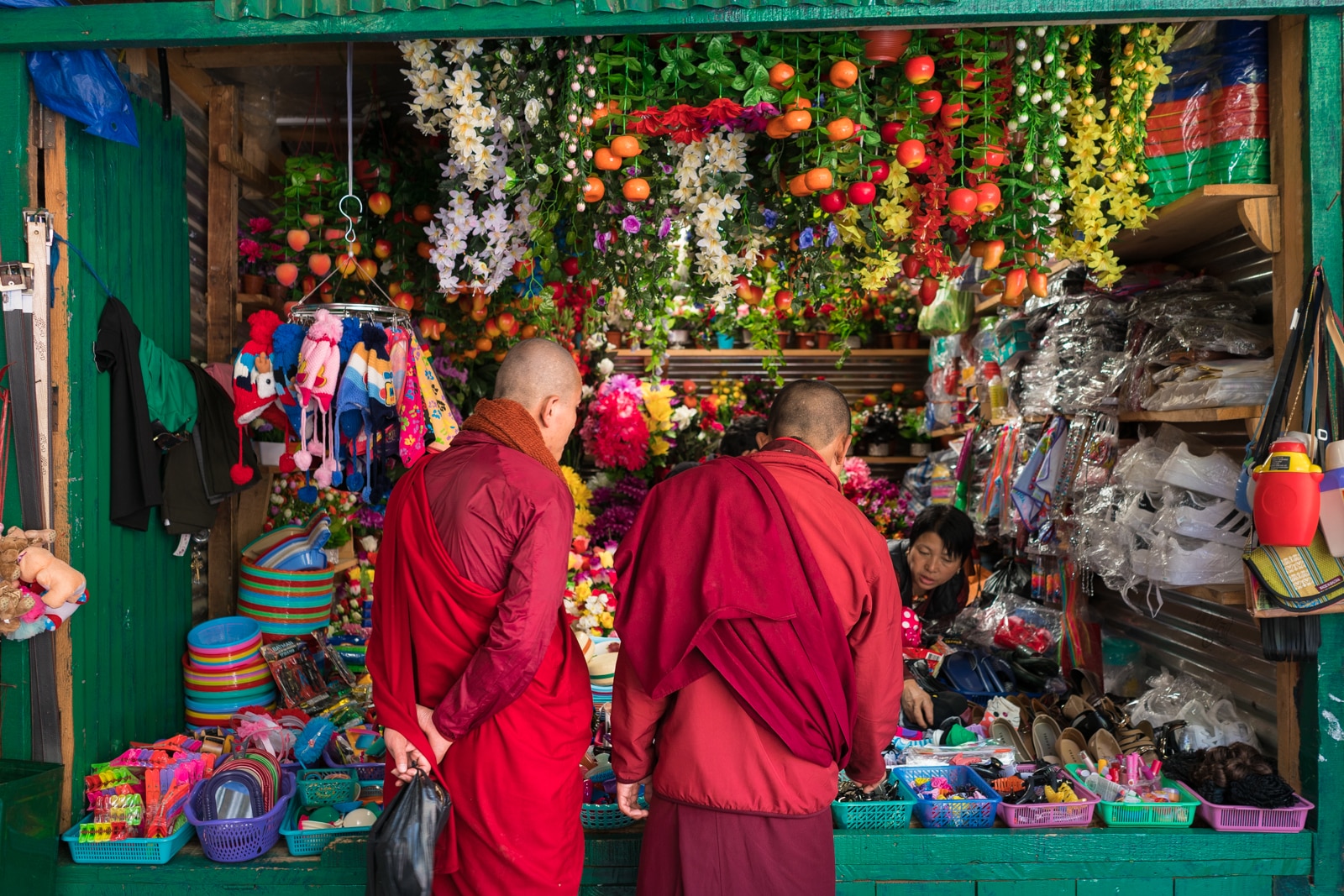
Shopping time for some monks at a local market
Why Bhutan is really worth your money
Okay, okay, it’s time for me to get off my soapbox. Although sustainable tourism is imperative, Bhutan’s forward-thinking policies aren’t the only reason it’s worth your money. You’ve stuck with me this far, so it’s about time I give you the answer you’ve been waiting for.
Why is Bhutan worth your money? Because it’s freakin’ beautiful, and there’s no other place in the world like it.
You can while away afternoons in Bhutan listening to the patter of shoes slapping stone amongst the white walls of dzongs, fortresses. Sometimes it’s a red-robed monk off to say prayers beneath towering statues of demons on the monastery side of the dzong. Other times it’s a woman in a silky kira dress making her way to work in the administrative side of the repurposed fortress.
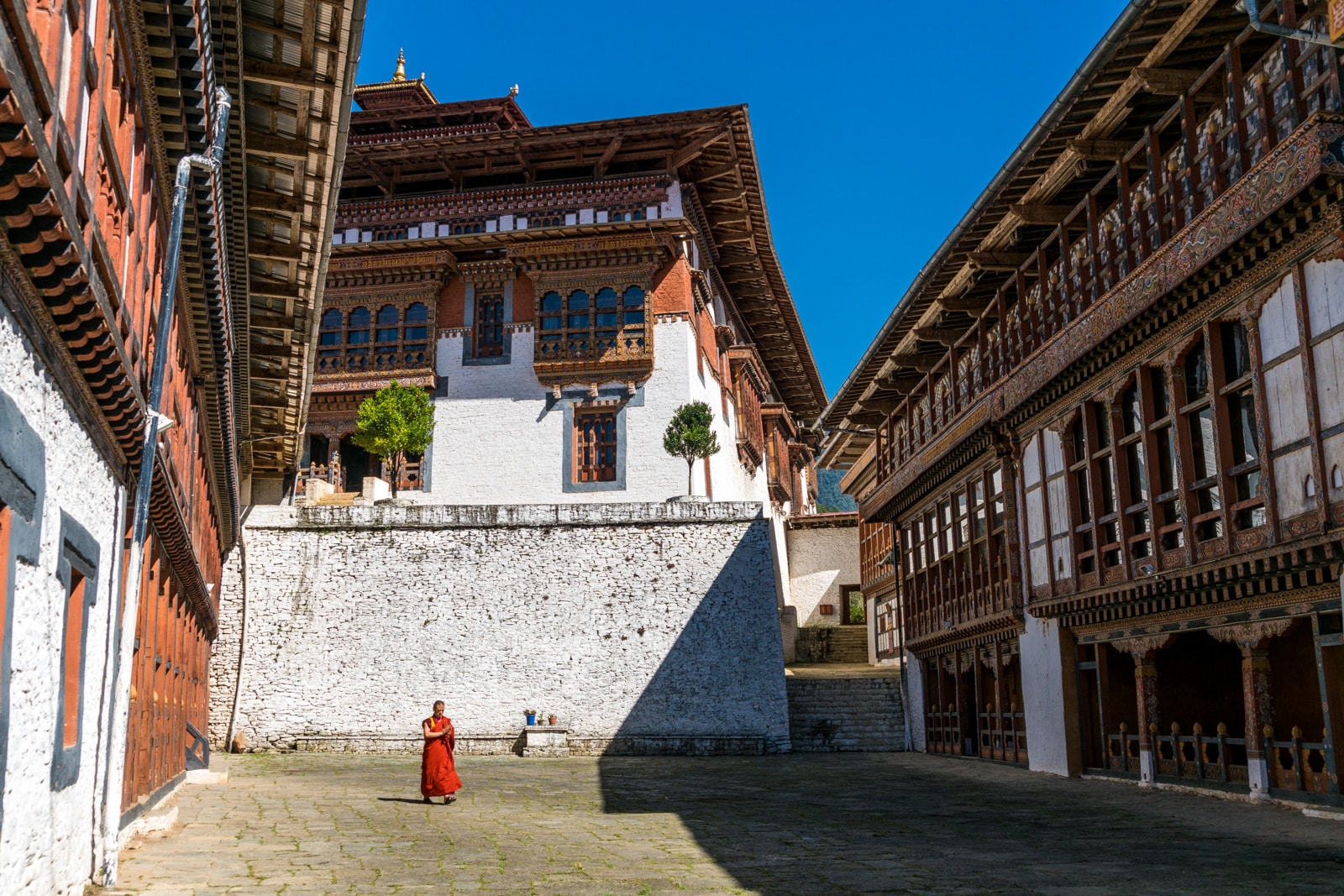
Off to monastic business in the Trongsa dzong
In the capital, Thimphu, you can go sightseeing by day, then trade traditional robes and historic monasteries for a cold cocktail and bumping beats in a nightclub with the country’s hippest youth.
While driving through Bhutan, you can feast your eyes on the houses pretty enough to be mistaken for temples lining the country’s hills. Some are painted with intricate knots and auspicious animals, while others are painted with hairy, ejaculating phalluses. Yes, really.
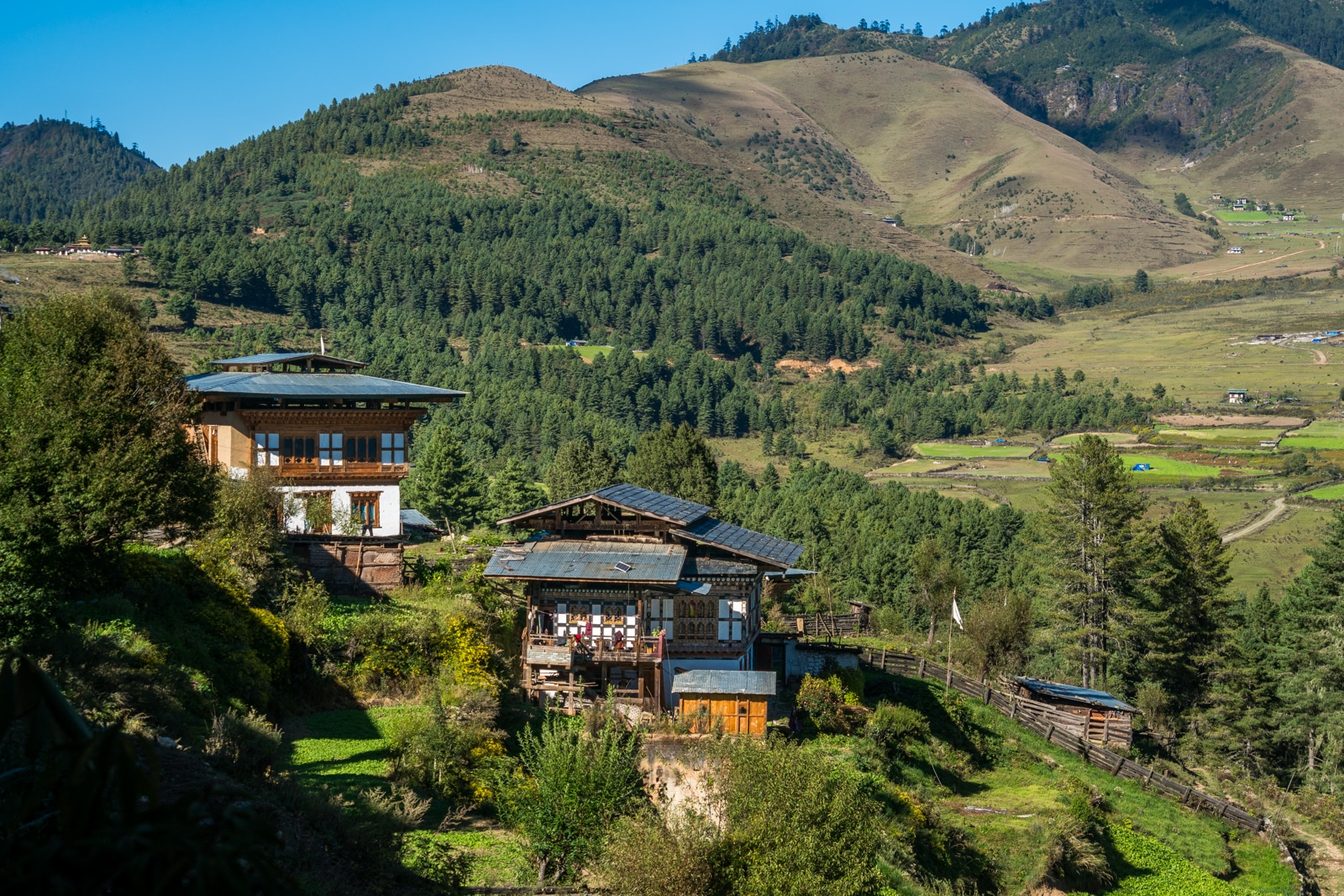
Practically perfect traditional houses in Phobjikha Valley
In Bhutan, you’ll never have to worry about sharing trekking trails. Far from the overcrowded routes of Nepal, even the most popular of Bhutan’s paths are delightfully quiet. The country’s 72% forest coverage means you’ll never go too long without a bit of greenery up above. Even better, Bhutan’s nature is pristine and clean; an experience I certainly haven’t encountered in other South Asian countries (though I have yet to visit Maldives).
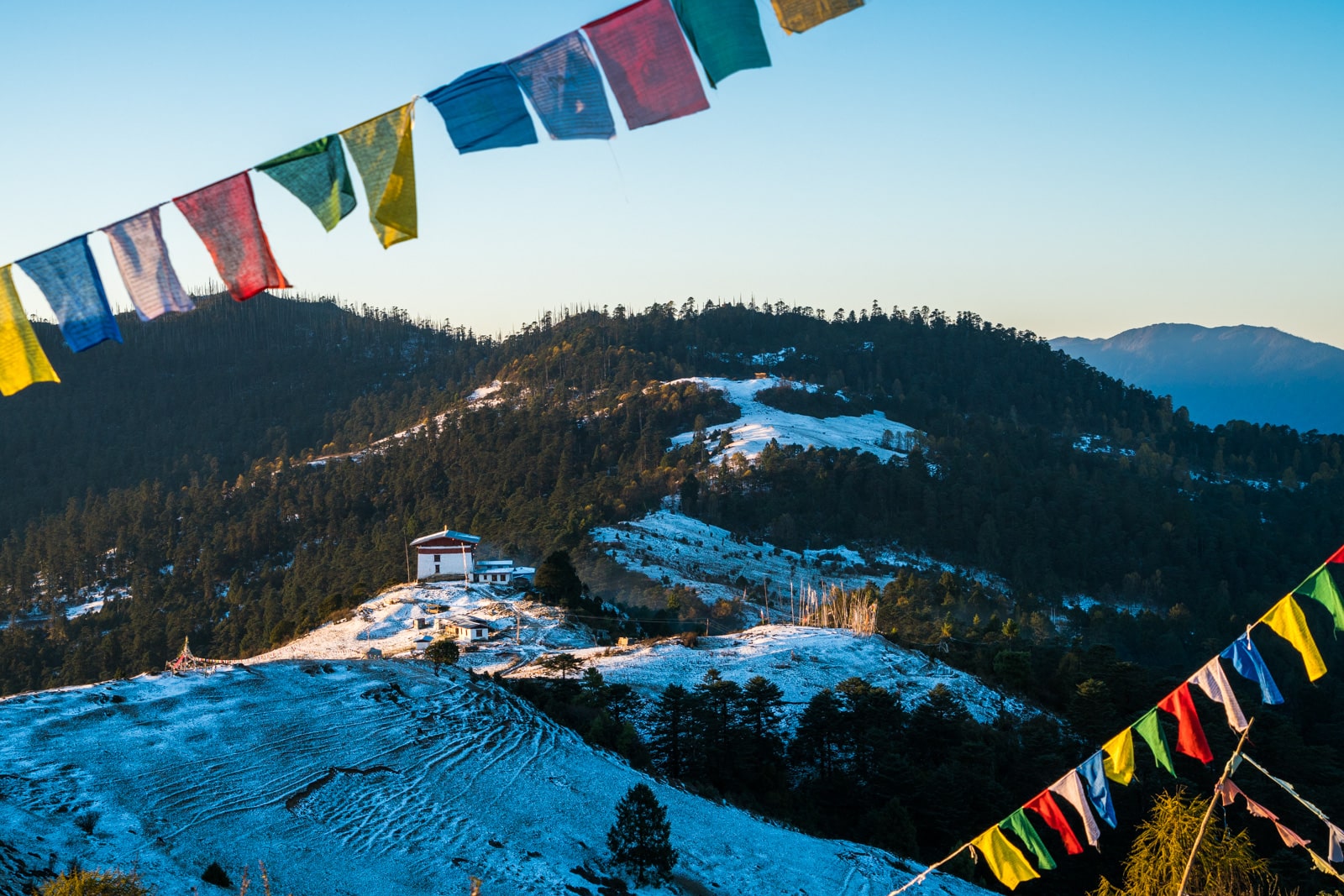
Despite the Druk Path being Bhutan’s most popular trek, there was no one to compete with for views like these.
The vast majority of people I met were are genuine and kind. They wanted to speak with me out of curiosity or interest, not because they’re scheming to sell you something as in more popular tourist destinations. Meeting local people was all too easy when I had a local tour guide by my side for (some of) the day. Even without Karma’s introductions, I still got talking with all kinds of people during my weeks in Bhutan.
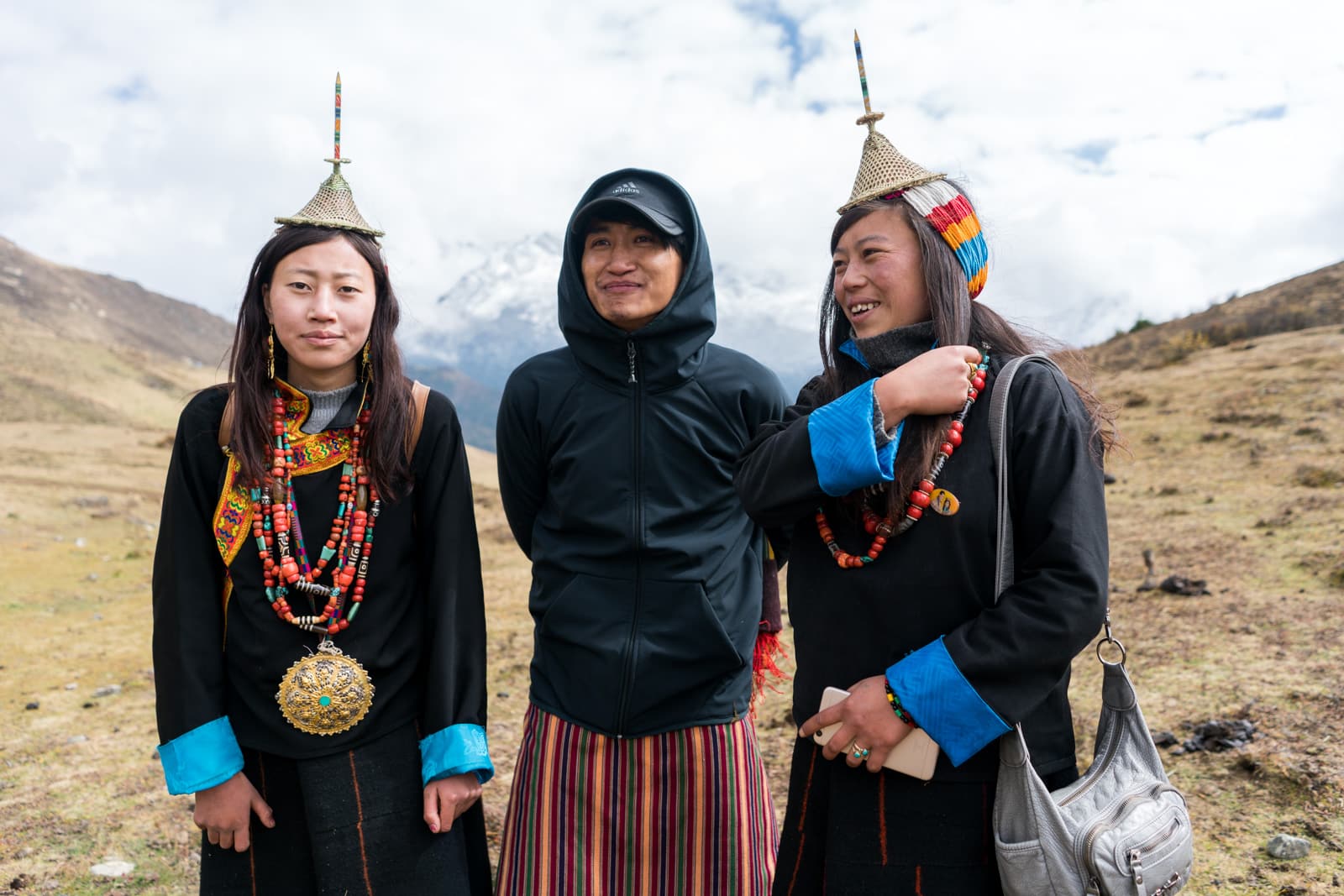
Karma posing for a photo with some local Layap ladies he introduced us to at the Royal Highlander Festival in Laya
The most straightforward reason Bhutan is worth your money, however, is the fact that it’s one of the most beautiful places in the world. In my humble opinion, anyway. Words won’t do that claim justice, so here’s some visual proof instead:
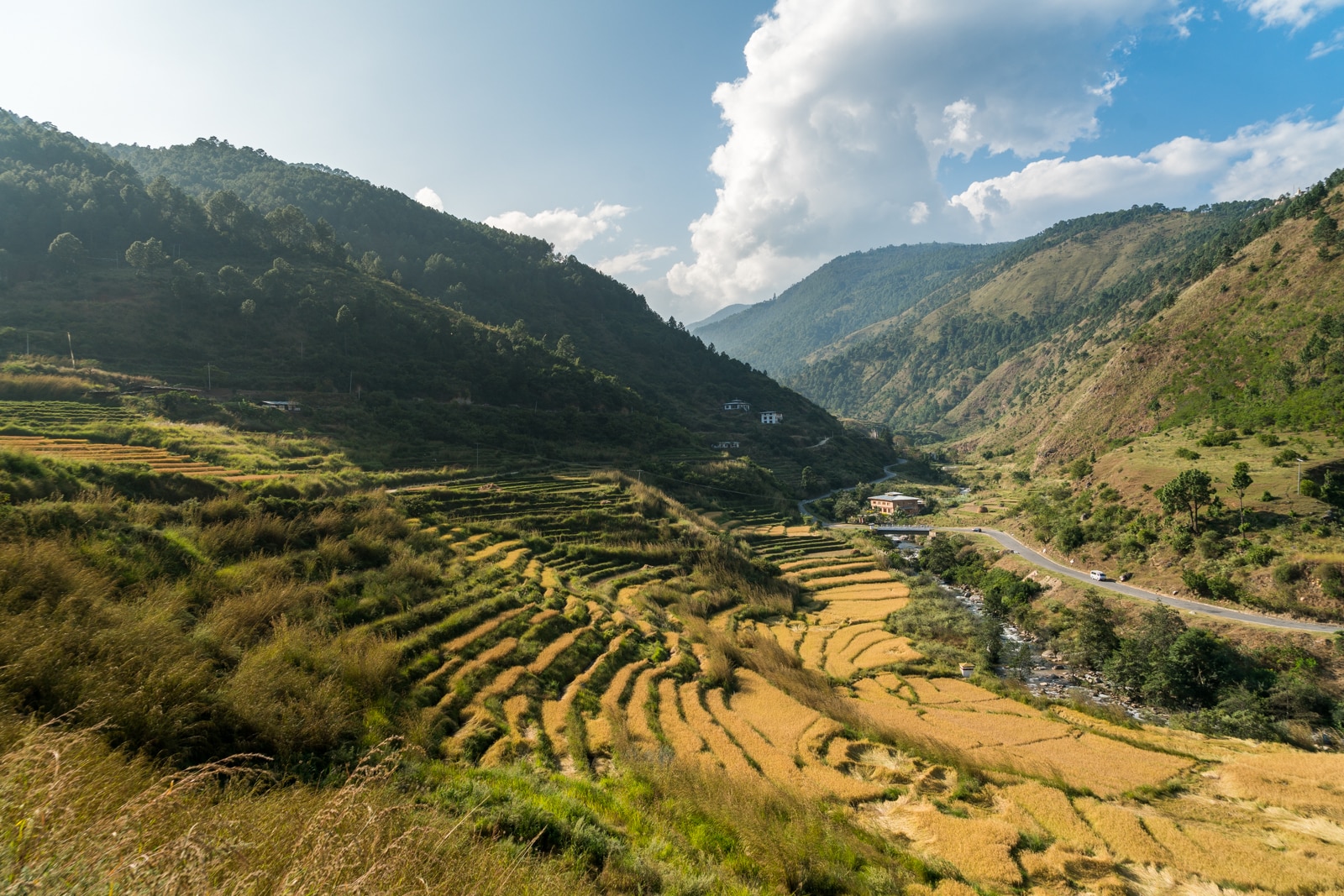
Casual highway-side views, NBD
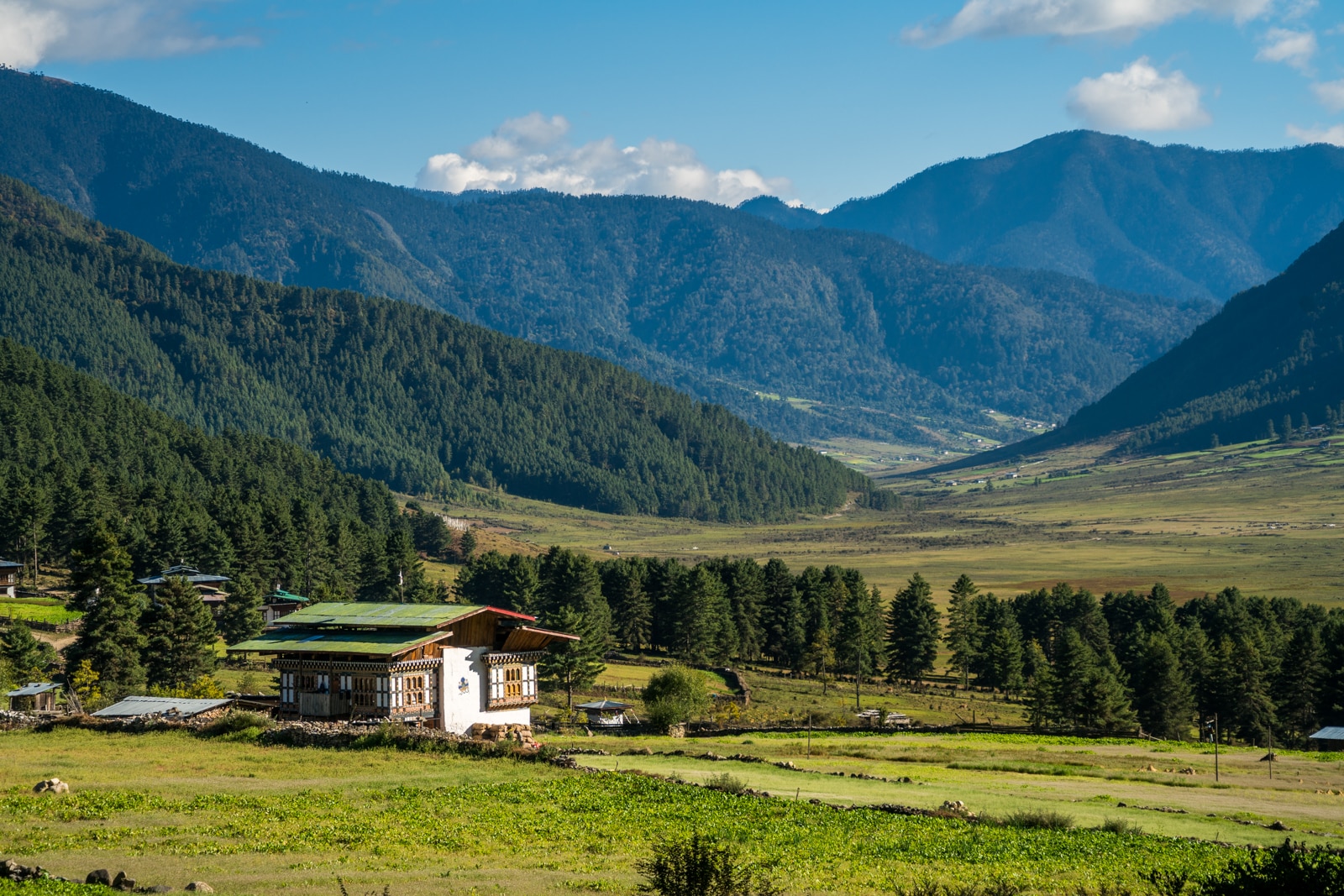
Yet more photogenic houses in the stunning Phobjikha Valley
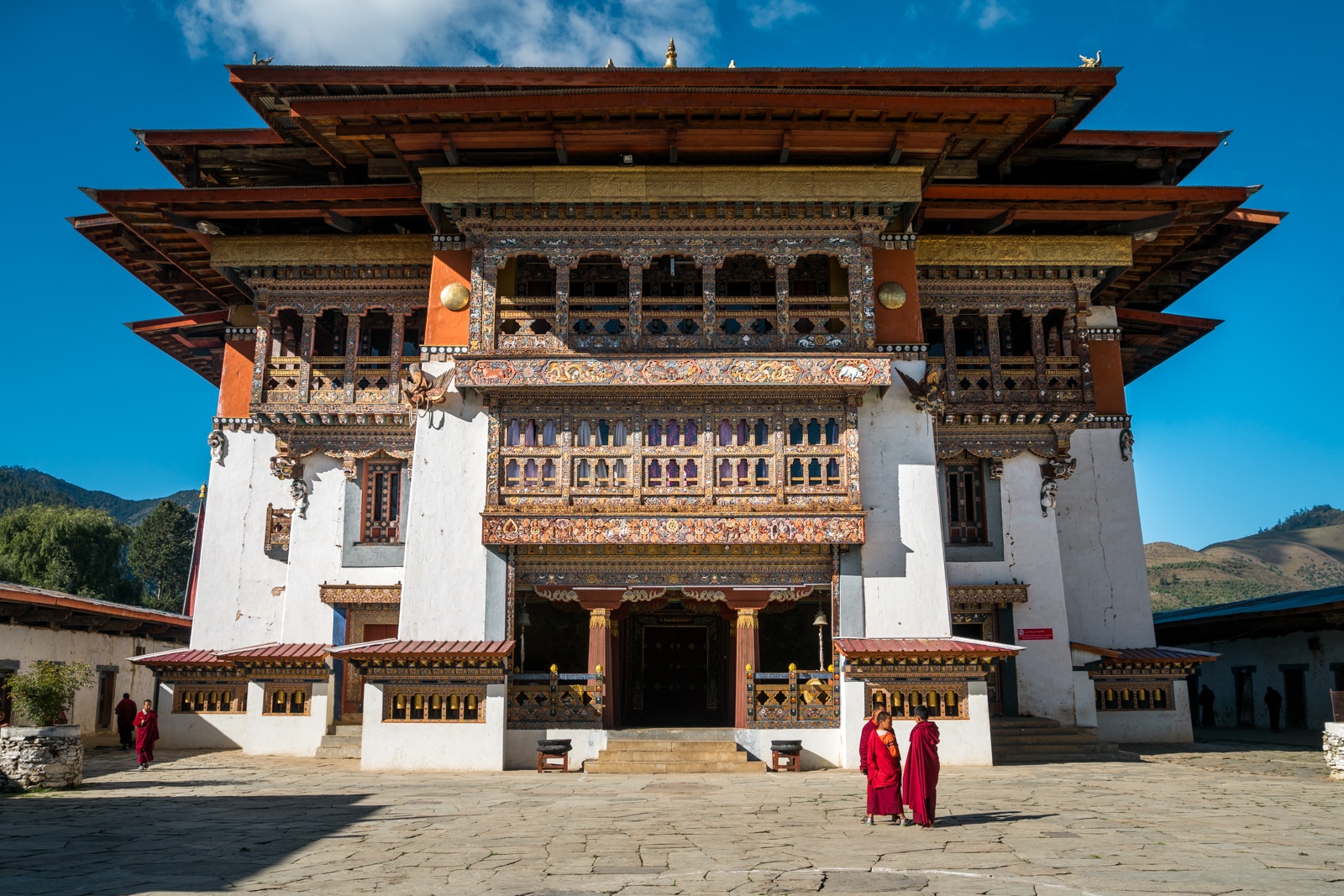
The exterior of Gangtey Monastery, the most impressive religious building I saw in Bhutan
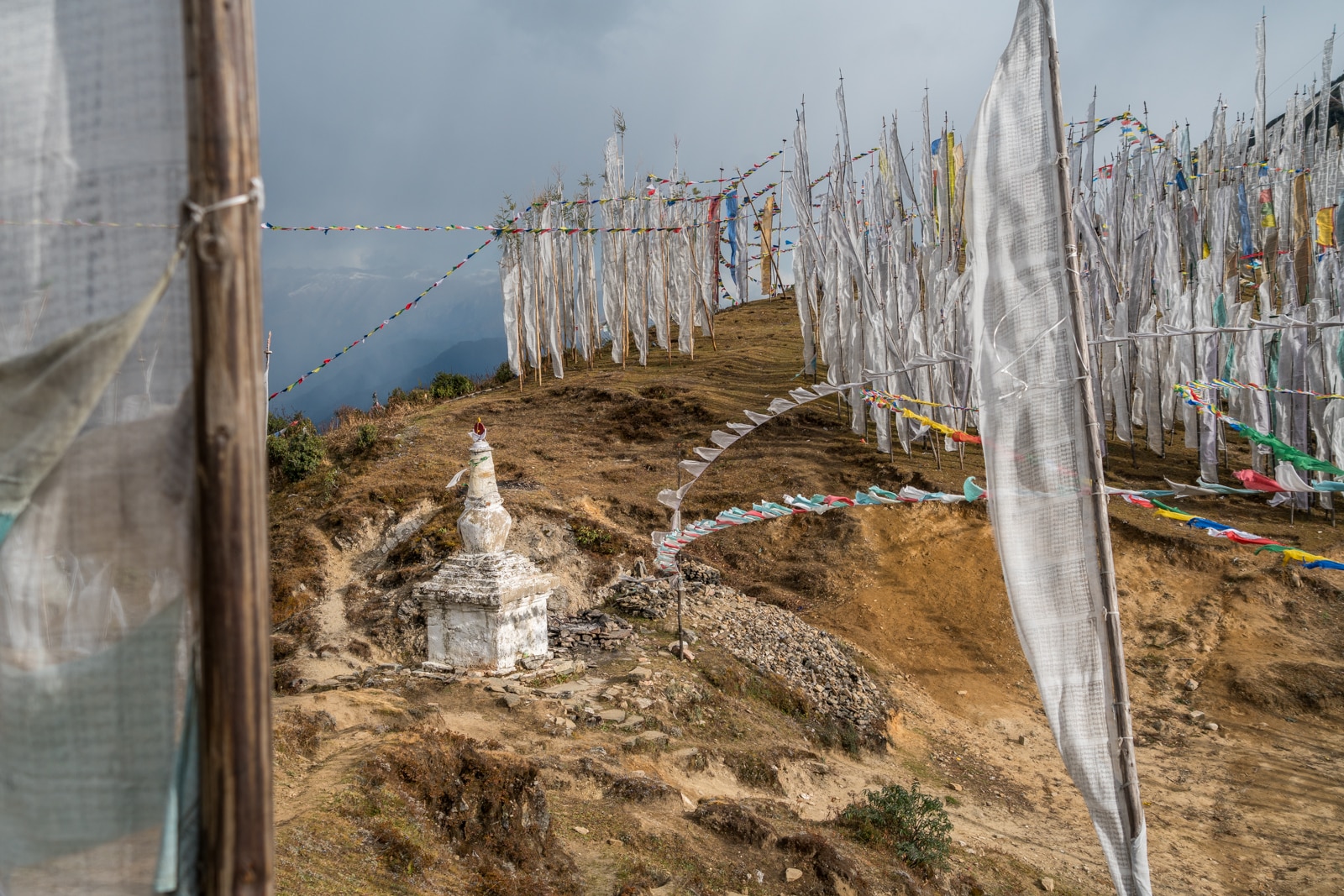
Just a few of the thousands of fluttering prayer flags atop Chele La pass
To travel to Bhutan, or not to travel to Bhutan? That is the question.
Ultimately, I can only convince you so much. Wonderful as Bhutan may be, you either have the money to visit Bhutan, or you don’t. This will decide whether travel to Bhutan is worth $250 per day or not.
If you don’t have the money, don’t fret. Though they’re worlds apart from Bhutan, there are other mountainous countries in this world that are cheaper to visit. Nepal is the crowd favorite, though I’d personally recommend Pakistan.
If, however, you do have the money, I can’t recommend Bhutan enough. It might be a big decision, but I assure you, you won’t regret it. If you are visiting Bhutan, make sure to check out my guide to travel in Bhutan.
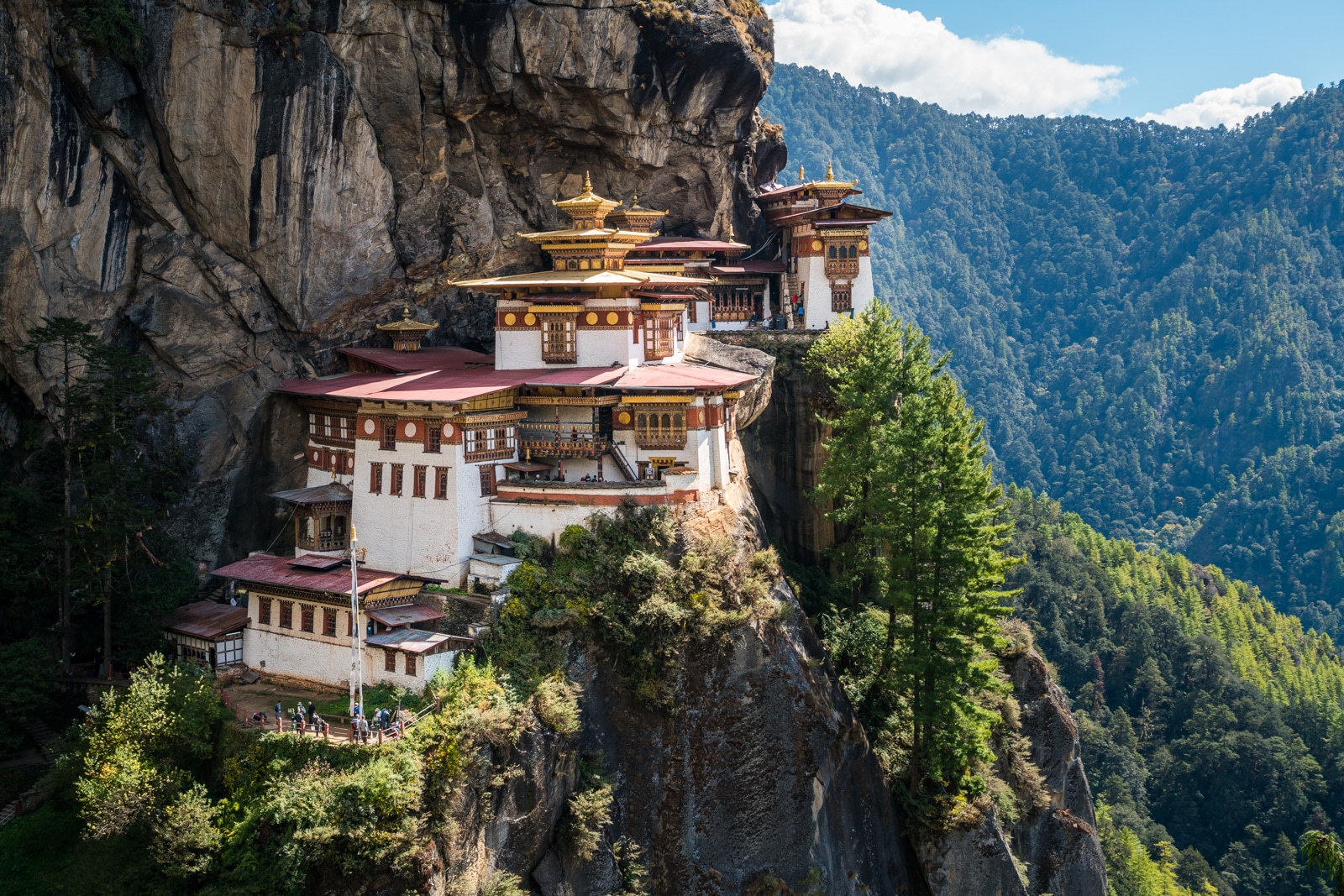
The famous Tiger’s Nest monastery near Paro
Think of it this way: choosing where to travel is like buying groceries. You can buy cheap, imported apples at your nearest supermarket, or you can head to the farmer’s market for some locally grown, organic apples. The supermarket apples may be cheaper, but we all know locally-grown apples at farmer’s markets are the responsible—and often tastier—choice.
Not everyone can afford to shop at a farmer’s market all the time, nor can everyone afford to travel to Bhutan over other destinations. But if you have the means and the motivation, I promise choosing Bhutan will be one of the most golden and delicious decisions you can make.
Yay transparency! My trip to Bhutan was sponsored by , but you can rest assured that I scrutinized the crap out of this topic just as I would if I paid my own way, and all these views are most definitely my own.
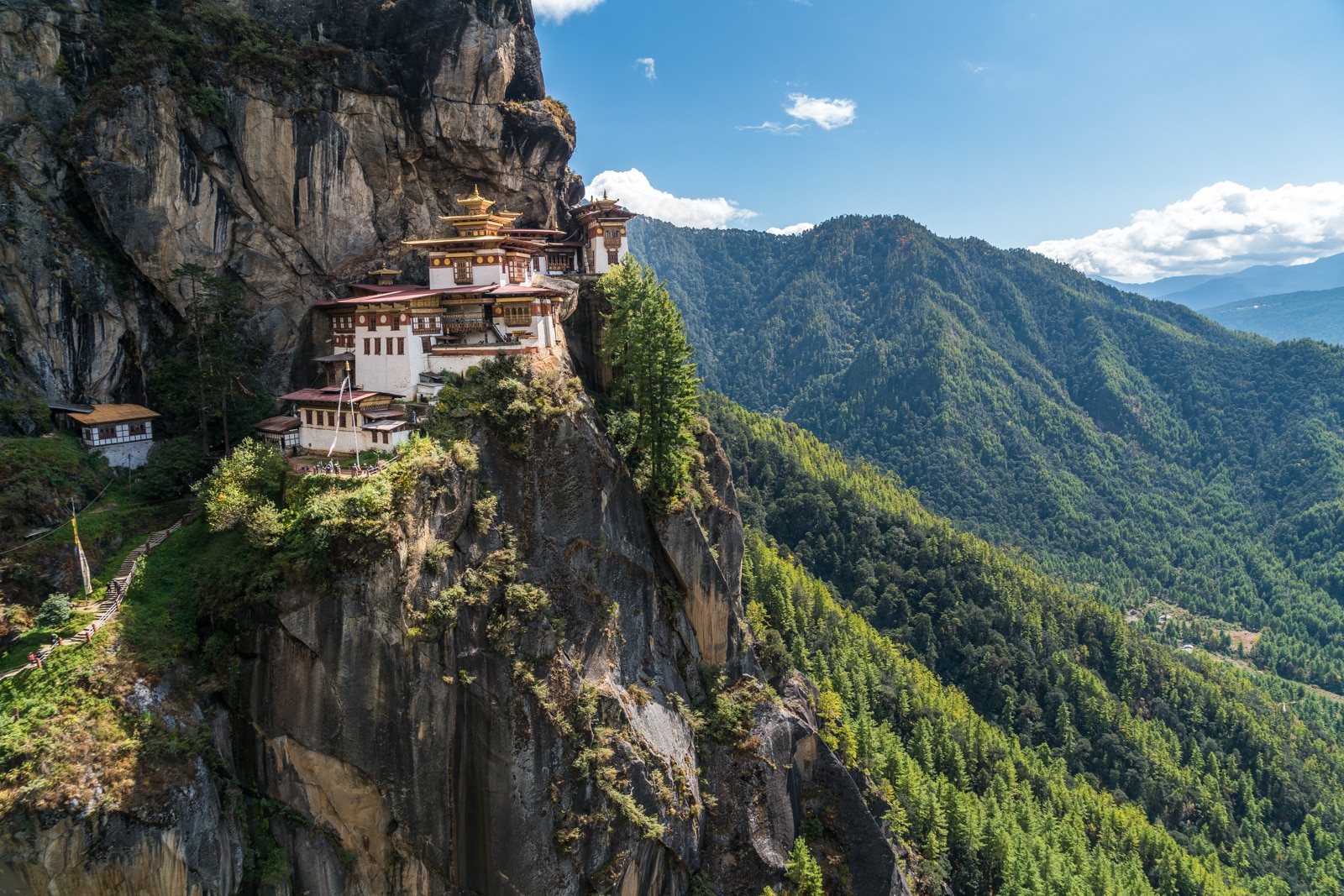
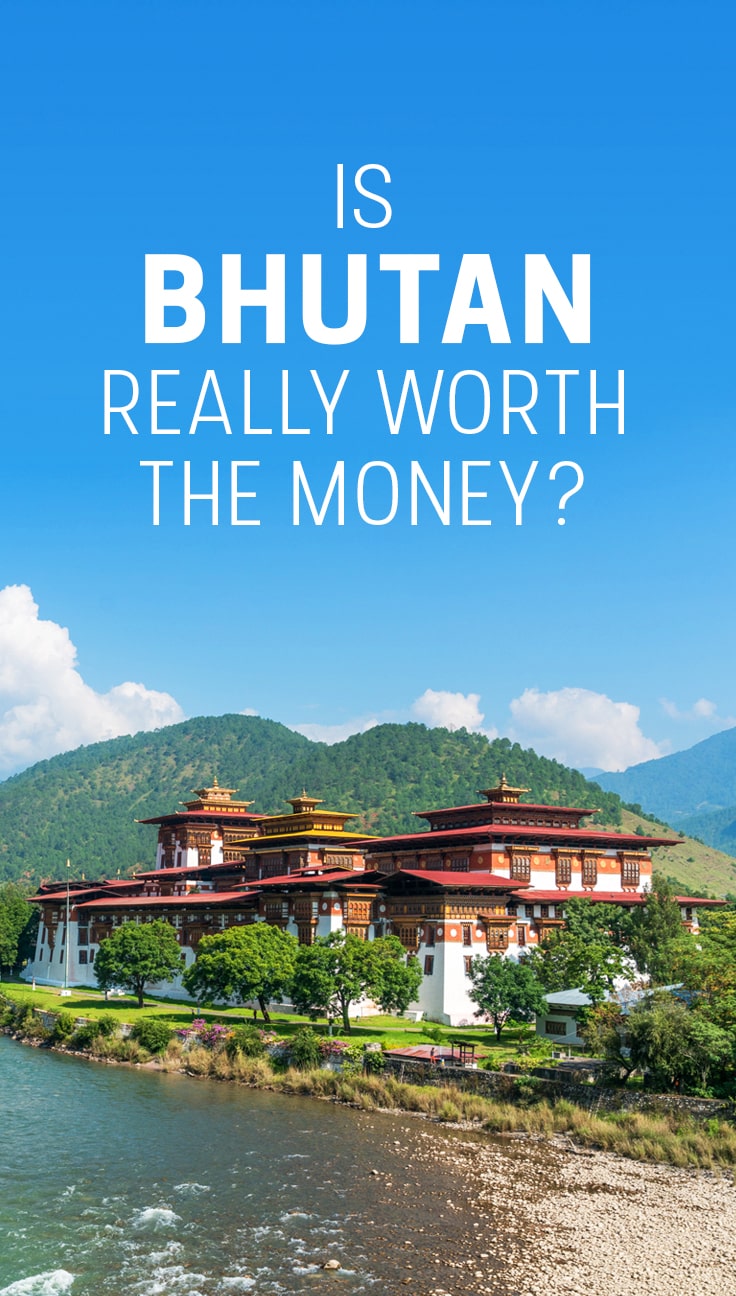
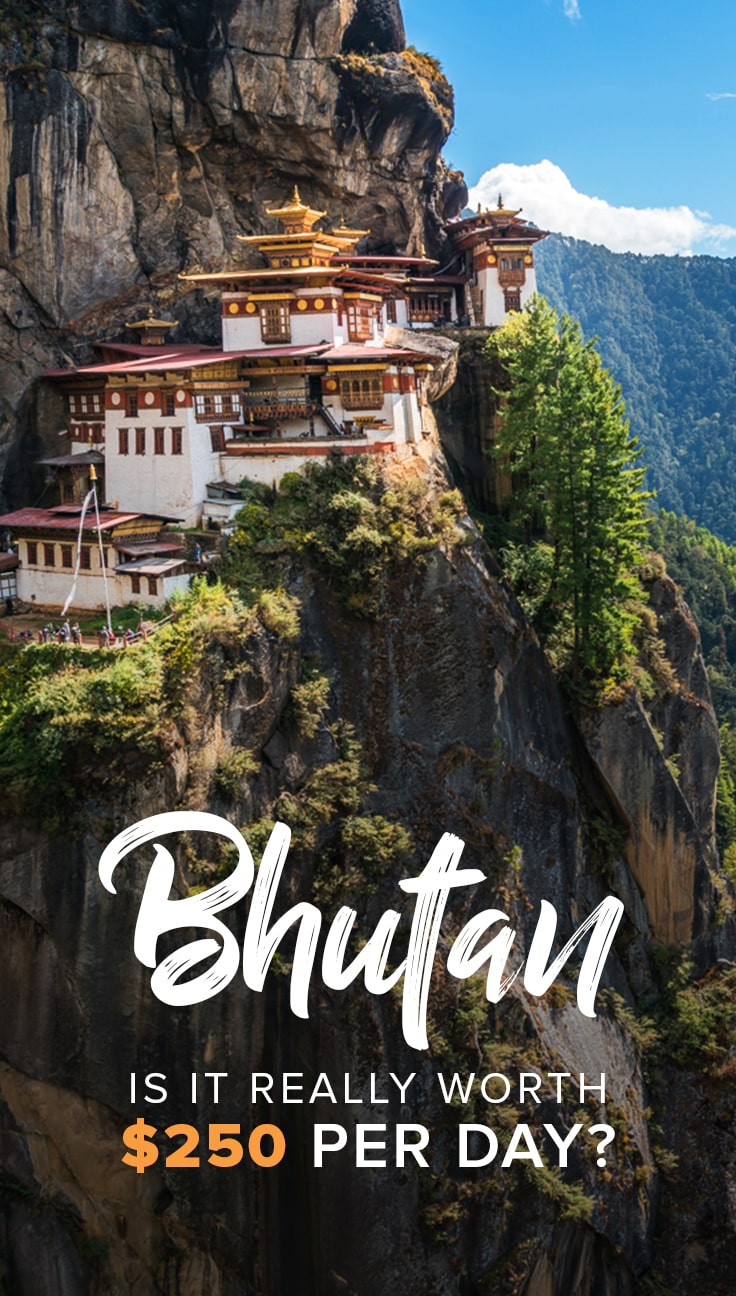


Having travelled to Bhutan back in 2008 (when the daily fee was smaller, but not that much smaller), I can only endorse both the local administration decision and Alex’s point that the all inclusive, expensive touring system they promote is correct. A few reasons:
– In Bhutan I met other tourists that, just like me, had saved for a good deal of time so as to be able to go there. The time these people had invested in saving and researching before actually being able to go resulted in their being far more respectful and knowledgeable than tourists in other countries, and let me only mention those neighbouring Bhutan.
– It is worth noting that the country opened up to foreign travel in 1974, following an international scientific expedition at the end of which most participants advised the administration against opening up to mass tourism in order to protect the untamed nature and culture. Anyone that has been to neighbouring Nepal or India knows what flows of uncontrolled tourism can lead to.
– This is a poor and difficult terrain country; both agriculture and production are severely limited by the natural conditions. So the fact that some of the money one pays goes to those Bhutanese needing support is welcome. While in the country, I could see many places where money was invested in actually improving things for the local population. This is why a country has an administration at the end of the day: to care for its people. And the pillars of the Bhutanese Gross Happiness Product clearly show where some of the tourism industry revenue goes.
– It is true, the country is quite singular in the world from this point of view. This means nothing, because its conditions are also different from most other countries in the world.
Having visited some 60 countries and working in tourism, I unfortunately saw the results of mass tourism in many parts of the world, including my home country. And then, just as Alex points out, travel is not a right. There are many other countries where one only needs a flight, bus, train or boat ticket and a valid passport or ID card in order to pass immigration. There is no need to travel somewhere if the visa granting procedure or one’s own principles are against it. The world would be a much better place if people went by the ‘live and let live’ principle.
Hi,
Great article. I am trekking in Nepal this March and may have the chance to spend 2 days in Bhutan. Do you think that is enough time to really experience things in Bhutan, and if so, could you recommend places to have in my itinerary?
Definitely one for my bucket list next year. Love the ideology behind the sustainable tourism. Bravo to Bhutan for sticking to their principles with the ever increasing threat gobalisation poses to society.
I had to laugh out so loud when i read this 😉
“The country wouldn’t be the same if drunk backpackers in elephant pants staggered by locals in traditional gho and kira. ”
Been saying it for ages…but then again it’s important to allow everyone to make his or own experiences.
Hello Alex and all people here,
It’s so nice to read about one’S own country and it’s more nice to know people having lots of good feels about Bhutan. Well I’m a young lady starting up a travel agnet in Bhutan and I would like to contact with any of you here who wishes to visit Bhutan. I will be so grateful to help any of you here.
Thank you ????
Thanks for your sweet kinds words. See you in Bhutan soon
If the purpose really is sustainable tourism, then what’s the purpose of an enforced guide? Why not just charge the fee, limit visa numbers, and let tourists do what they want?
If the fee goes towards lifting poverty, why is “much of the country’s population” still poor after 40 years of absurdly high levies?
For that matter, why do they charge amounts that are completely out of proportion to the cost of living for the general population, and are clearly just making a few people very rich?
And why do they charge foreigners much higher rates than Indian visitors for the same services?
Why do they say they want to restrict the number of tourists, but then allow India, Bangladesh, and the Maldives more or less unrestricted access?
Why are they building a “slick new highway across the country” when they say they want to totally conserve their lands?
Why do they say they’re trying to protect themselves from globalism, and then allow the internet?
Why are they allowed to block immigrants and foreigners in the name of cultural conservation, when we would label those exact same sentiments as grossly nationalistic, bordering on far-right extremism, anywhere else in the world? Why does Bhutan get a free pass for xenophobia?
I’ve got a lot of respect for whoever’s running Bhutan’s PR. The stuff they get away with is mind boggling.
– Enforced guides ensure tourists receive proper education on cultural norms, practices, etc. and adhere to them. It limits cultural insensitivities.
– Because the country is land-locked, deprived of profitable industry, and many people do not have access to resources due to their incredibly remote locations. Nothing is an immediate fix, but tourism is one avenue to uplifting the population.
– They’re not just making a few people rich. Clearly you are missing the point. As for the fee, it is meant to be a deterrent to limit the number of tourists; a fair play when the country only has 800,000 people in it.
– India is Bhutan’s big brother, and has dangerous amounts of control over the country. It pressured Bhutan into allowing its residents to visit without fees for a time, much to the despair of Bhutan’s tourism industry. It is a massive problem that upsets the balance, which Bhutan is trying to find alternative routes to solve.
– Highways allow for easier shipping of resources to remote areas, easier access of residents to essential amenities like hospitals and universities, and easier access of tourists to more remote areas, thus enabling more people to travel deeper and inject more money into far-flung areas.
– Because not “allowing” the internet is essentially depriving people of a basic human right in our day and age.
– Because travel is not a right. Other countries practice this in the name of conservation and limiting mass tourism – Botswana is an example.
I suggest researching this policy more before letting your hostility run rampant.
Research what, exactly? The policy’s pretty clear already. It’s the justification for it that isn’t.
So somehow the internet’s a human right but travel isn’t? Give me a break. The reason our world is in such a mess is precisely because of the restrictions on freedom of movement (which is what travel is). This slavish devotion to arbitrarily defined borders, “protecting” culture, and controlling migration only leads to xenophobia, suffering, and greater income disparity. Because now, in Bhutan and in so many other places, the poor are excluded. Travel, and migration, is restricted to people who can pay staggeringly large amounts of money. Does that seem right to you?
By the way, if the fee’s “meant to be a deterrent”, then you’re saying it’s an artificially high figure, higher than what is necessary to pay the people involved. And if the government’s cut is only $65, some people ARE making large amounts of money off this. Anyway, there are far easier ways to deter tourists – restricting the number of visa is a blindingly obvious place to start. But they’re not doing that because they don’t actually want to deter tourists at all. They just want to profit from them.
I have nothing against Bhutan (apart from their LGBTQI stance, which is admittedly improving). I have nothing against the conservation of culture, either, although turning the country into a incredibly expensive museum display is absurd. I agree that there’s no immediate fix, but this is clearly not a fix at all. It’s a policy which has been in place for a very long time, and based on the data it’s simply not working. It shouldn’t be hard to redistribute and equalize wealth in a tiny country where happiness is your only stated goal (universal basic income, anyone?) but they’ve consistently failed to do it. And not only is it not working, it’s a policy which anywhere else in the world (North Korea, lets say, which does practically the same thing) would be slammed.
But there’s no hostility on my part. It’s just a weariness in listening to enlightened travel bloggers spout the same government-fed banalities without thinking critically for themselves.
Also, the off-hand comment about Bhutan’s “unscrupulous” neighbours in the article really bothered me a bit more than it should.
But I do want to say that apart from this article, I really like the blog and admire what you do!
Hi, how do I book a tour to Bhutan, do I just book a hotel and then they arrange a guide and meals and the fee or how do I do it ?
You have to book a tour through a registered tour company, and they will arrange everything else for you.